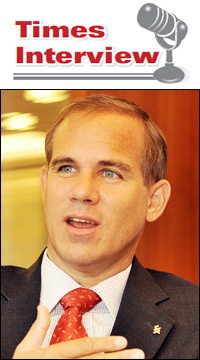SC Bank to press on with meritocracy
The chief of Standard Chartered Bank in Korea hinted that the bank will soon introduce a performance-based wage system to build a more meritocratic corporate culture and turn SC into the nation’s best international lender.
In an interview with The Korea Times last week, Richard Hill, CEO of the Korean arm of the U.K. banking giant, said that management and the labor union have been in productive talks to implement a meritocratic system. He said the talks were in their final stages to fine-tune minor differences.
“We work with the labor union very closely. We have become more productive since the strike. I am confident that we will continue to find ways to move forward,” Hill said.
“We have agreed to a series of resolutions. We just need to be sensitive to how we can implement them,” he added.
The British lender is currently running a partial meritocratic system based on incentives and bonuses. The two parties have agreed in principle on the introduction of full-scale meritocracy and are now discussing details on how to implement it.
The talks have lasted since the lender suffered a two-month strike in 2011. About 3,000 employees of the bank went on a 65-day strike and stayed in the resort town of Sokcho, Gangwon Province from June to August last year.
Hill’s attempt is likely to be a litmus test for the Korean banking industry as many lenders are aware that they need to adopt a performance-based system but are reluctant to do so in the face of strong union opposition.
The SC CEO seems to believe that the most urgent change needed by the bank in order to increase its chances of becoming a competitive player is to build a more meritocratic corporate culture where employees are rewarded based on their performance rather than working years.
The 48-year-old said his bank will capitalize on its global network to be the nation’s best international bank, helping Korean firms speed up globalization.
“Our vision is to be Korea’s best international bank. We believe that Standard Chartered is best-placed to link Korea with Asia, Africa and the Middle East. We can help Korean companies grow their business internationally.”
In particular, Hill is focusing on the African market. “Africa has abundant resources, such as oil, land, copper and commodities. China is doing much business there and we are ready to help Korean companies in the region,” he said.
SC operates Korea desks in countries such as Vietnam, Malaysia, Indonesia and Singapore, to support Korean companies expanding into Southeast Asian markets.
Regarding Korean financial firms, Hill, who took the helm at SC in December, 2009, said that the bank should look to overseas markets to find new opportunities, noting that financial firms can find success abroad as manufacturing giants have done.
“It’s not fundamentally different. In terms of relationships, I don’t think it’s any more difficult for Korean financial firms than Korean industrial firms,” he said.
“It’s tough, but Korean (financial) companies should go overseas. But they should be patient.”
The CEO said that the key strength of Korean companies such as Samsung and LG was their adaptability.
“Korean companies have competency and expertise. If you look at what Samsung has done, there are elements of its appetite to learn and change that can be learned from,” he said.
For Hill, another key task is to make the lender a leader in “smart banking.” He said the bank plans to establish 10 additional smart banking centers to the existing two this year. Smart banking center refers to automated banking where customers use computerized facilities without requiring help from staff. <The Korea Times/Kim Jae-won>






















































